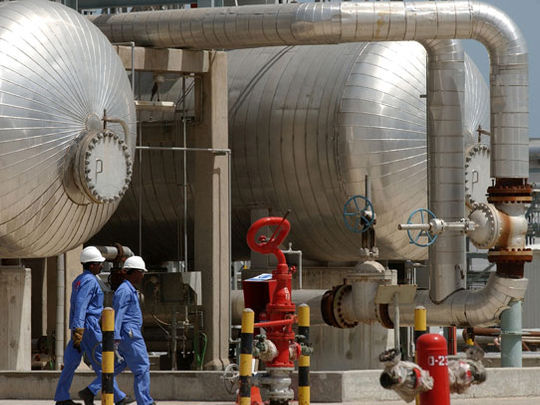
Kuwait City: Energy kingpin Saudi Arabia and other wealthy Gulf states are set to resist pressure to tighten the taps significantly to shore up oil prices as the global economy stumbles, analysts say.
Oil prices have fallen by a quarter since June as excess supply and weaker demand create a glut on world markets, prompting some other exporters to call for cuts in output.
But while curbing production could help to arrest the price decline, it would also leave the Gulf states at risk of losing market share.
Fortunately for the six nations of the Gulf Cooperation Council (GCC) — which sit on 40 per cent of the world’s oil and a quarter of its natural gas — they are flush with cash, analysts said.
“The GCC states are in a strong position to remain steadfast for a few years” if there is a dispute over production, Kuwaiti oil analyst Mussa Maarafi said.
“Saudi Arabia and most Gulf states will not be bothered a lot, at least in the short term” and “will be able to resist pressure to cut production and lose market share”, Maarafi, a former member of Kuwait’s Supreme Petroleum Council, said.
The benchmark US oil price has fallen to levels not seen since mid-2012, while in London Brent North Sea crude is around a four-year low.
The price of US West Texas Intermediate (WTI) stood at around $81 a barrel on Friday while Brent was changing hands for about $86.
Prices had rebounded briefly on Thursday as traders reacted to an unconfirmed report that Saudi Arabia trimmed its crude supplies slightly in September.
But the recovery proved short-lived as markets grew sceptical about the report and fretted over sluggish demand.
Analysts said the Gulf nations were likely to remain relatively sanguine about market conditions.
“I don’t think GCC states will be harmed a lot by the drop in oil prices in the short term,” Saudi economist Abdullah Al Kuwaiz said.
The Gulf nations have based their budgets on an oil price of $80 a barrel or less, said the former senior GCC economic official.
“Most of the GCC states have built a strong fiscal cushion that allows them to bear the consequences” of the price fall, Kuwaiz added.
Four GCC states — Kuwait, Qatar, Saudi Arabia and the UAE — together produce 16 million barrels a day, accounting for more than half of the total pumped by the OPEC oil exporters’ cartel.
The other two, Oman and Bahrain, are not members of Opec.
The revenues of the GCC states, mostly from oil, rose from $366 billion (Dh1.3 trillion) in 2009 to $729 billion last year, according to figures from Kuwaiti investment firm Kamco investments and the IMF.
As a result, the GCC states have built fiscal reserves worth a massive $2.45 trillion, accumulated from the oil windfall over the past decade, according to the International Institute of Finance (IIF).
Saudi Arabia — the world’s top crude exporter — and other Gulf states have repeatedly cut crude prices for the Asian markets and shrugged off calls to reduce production or to hold an emergency Opec meeting.
“Statements coming out from Saudi Arabia do not indicate that the kingdom will give up any part of its output to cool the market,” said Kuwaiz.
According to the International Energy Agency (IEA), Saudi Arabia actually increased its output in September to 9.73 million barrels a day, despite the market rumours to the contrary.
“Riyadh appeared determined to defend its market share,” the IEA said.
Analysts at the British bank HSBC estimate that Saudi Arabia has enough financial reserves to fund three full years of public spending at the current price.
But while they are better placed than other producers such as Russia and Iran to ride out the storm, even the GCC states face a dimming outlook.
Kuwait’s budget surplus is expected to dive to $3.1 billion this fiscal year, from $45 billion last year, unless prices rebound, said the head of parliament’s budgets committee, Adnan Abdulsamad.
Kuwaiti Finance Minister Anas Al Saleh called on Saturday for economic reforms by the Gulf states to diversify their economies and “reduce dependence on oil”.
Saudi Arabia for its part accounts for 22 per cent of Opec crude reserves, 31 per cent of its output and the bulk of the world’s spare production capacity, said Ali Aissaoui, senior consultant at Arab Petroleum Investments Corp.
Over time, however, warming Iranian relations with the West and a return to stability in Iraq could lead to production gains that “challenge Saudi Arabia’s leadership”, he added.












